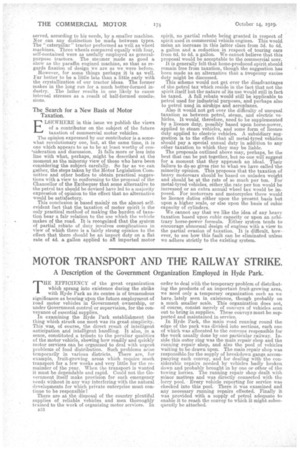The Search for a New Basis of Motor Taxation. The Search for a New Basis of Motor Taxation.
Page 2

If you've noticed an error in this article please click here to report it so we can fix it.
ELSEWHERE in this issue we publish the views of a contributor on the subject of the future taxation of commercial motor vehicles. The opinion expressed by our contributor is a somewhat revolutionary one, but, at the same time, it is one which appears to us to be at least worthy of con9sicleration and discussion. It falls more or less into line with what, perhaps, might-be described at the moment as the minority view of those who have been considering the subject carefully. So far as we can gather, the steps taken by the Motor Legislation Committee and other bodies to obtain practical suggestions with a view to conforming to the proposal of the Chancellor of the Exchequer that some alternative to the petrol tax should be devised have led to a. majority expression of opinion to the effect that no alternative
would be satisfactory. •
This conclusion is based mainly on the almost selfevident fact that the taxation of motor spirit is the only practical method of making the burden of taxation bear a fair relation to the use which the vehicle makes of the road. It is recognized that the system of partial rebate of duty involves complications in view of which there is a, fairly strong opinion to the effect that there should be an import duty on a flat rate of 4d. a gallon applied to ari imported motor
spirit, no partial rebate being granted in respect of spirit used in commercial vehicle engines. This would mean an increase in. this latter class from 3d. to 4d. a gallon and a reduction in respect of touring cars from 6d. to 4d. a gallon. We cannot believe that this proposal would be acceptable to the commercial user. It is generally felt that home-produced spirit should remain free from taxation, though the suggestion has been made as an alternative that a twopenny excise duty might be discussed.
This scheme would not get over the disadvantages of the petrol tax which reside in the fact that not the spirit itself but the nature of its use would still in fact be taxed. A full rebate would still be -applicable to petrol used for industrial purposes, and perhaps also to petrol used in airships and aeroplanes. Also it would not get over the difficulty of unequal taxation as between petrol, steam, and electric vehicles. It would, therefore, need to be supplemented by a licence duty, possibly based upon horse-power, applied to steam vehicles, and some form of licence duty applied to electric vehicles. A subsidiary suggestion is to the effect that all metal-tyred vehicles should pay a special annual duty in addition to any other taxation to which they may be liable. The proposals outlined above may, perhaps, be the best that can be put together, but no one will suggest for a moment that they approach an ideal. Their failure to do so gives rise to what we have called -the minority opinion. This proposes that the taxation of heavy motorcars should be based on unladen weight and should be at the rate of RO much per ton. For. metal-tyred vehicles, either the rate per ton would be increased or an extra annual wheel tax would be imposed. For motorcars and motorcycles there would be licence duties either upon the present basis but upon a higher scale, or else upon the basis of cubic capacity of cylinders.
We cannot say that we like the idea of any heavy taxation based upon cubic capacity or upon an arbitrary horse-power formula. Either system tends to encourage abnormal design of engines with a view to the partial evasion ssf taxation. It is difficult, however, to see how this fault can be eliminated unless we adhere strictly to the existing system.
























